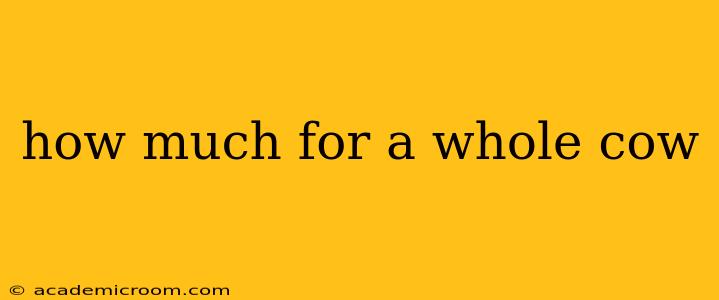How Much Does a Whole Cow Cost? A Comprehensive Guide
Buying a whole cow can be a significant undertaking, offering potential savings and a connection to your food source, but the cost varies widely depending on several factors. This guide breaks down the price, addressing common questions and helping you understand the true expense.
What factors influence the price of a whole cow?
The price you pay for a whole cow hinges on several key factors:
-
Breed: Different breeds command different prices. Popular beef breeds like Angus tend to be more expensive than others. The breed affects the quality of the meat, influencing the final cost.
-
Weight: The weight of the cow at processing directly impacts the total cost. A heavier cow will yield more meat, but also costs more upfront. Prices are often quoted per pound of hanging weight (the weight of the carcass after slaughter and initial trimming).
-
Processing Fees: This is a crucial component often overlooked. Processing fees encompass slaughter, butchering, cutting, wrapping, and freezing the meat. These fees can vary significantly based on location and the services offered by the processor.
-
Location: Geographical location significantly impacts the price. Costs associated with raising cattle, transportation, and processing vary regionally. Rural areas may have lower prices than urban areas.
-
Time of year: Seasonal fluctuations can affect the price of beef, though this is less dramatic than for other agricultural products.
-
Direct-to-consumer vs. middleman: Buying directly from a rancher often results in lower prices than purchasing through a retailer or intermediary.
H2: How much does a whole cow typically cost?
There's no single answer to this question. The total cost can range from $2,000 to $6,000 or more. This wide range reflects the variables mentioned above. To determine a more accurate estimate for your situation, you must consider the weight, breed, and processing fees in your region. It's best to contact local ranchers and processors for accurate pricing.
H2: What is included in the price of a whole cow?
The "whole cow" typically includes all the usable cuts of beef from the animal. This includes various steaks (ribeye, sirloin, T-bone, etc.), roasts (chuck, brisket, etc.), ground beef, and other cuts suitable for stewing or other cooking methods. However, the exact cuts and quantities will depend on the butchering preferences you specify to the processor. You might also receive organ meats, depending on your arrangement with the rancher.
H2: What are the processing fees for a whole cow?
Processing fees are a significant additional expense. These can range from $500 to $1,500 or more, depending on the size of the cow, the services requested (custom cuts, vacuum sealing, etc.), and the location of the processor. It's vital to obtain a detailed quote from the processor before committing to the purchase.
H2: Is buying a whole cow cheaper than buying beef at the grocery store?
Buying a whole cow can be cheaper per pound than purchasing individual cuts at the grocery store, but it's crucial to do the math. Factor in all costs – the purchase price of the cow, the processing fees, and any storage costs – to determine the overall cost per pound.
H2: How much beef do you get from a whole cow?
The amount of beef you receive depends on the cow's weight. A 1,000-pound cow will yield approximately 600-700 pounds of hanging weight. After butchering and trimming, you can expect around 400-500 pounds of usable beef.
H2: Where can I buy a whole cow?
You can typically find whole cows for sale through local ranchers, farmers' markets, and online agricultural marketplaces. Directly contacting local farmers is often the best approach to secure a fair price and establish a relationship with your food source. Researching local options in your area is recommended.
Conclusion:
Buying a whole cow is a significant investment. Thorough research, careful planning, and obtaining multiple quotes from ranchers and processors are crucial to making an informed decision. By understanding the factors affecting the price and carefully considering all costs, you can make a decision that's both financially sound and aligns with your needs and preferences. Remember to factor in storage space and the commitment involved in utilizing a large quantity of beef.
